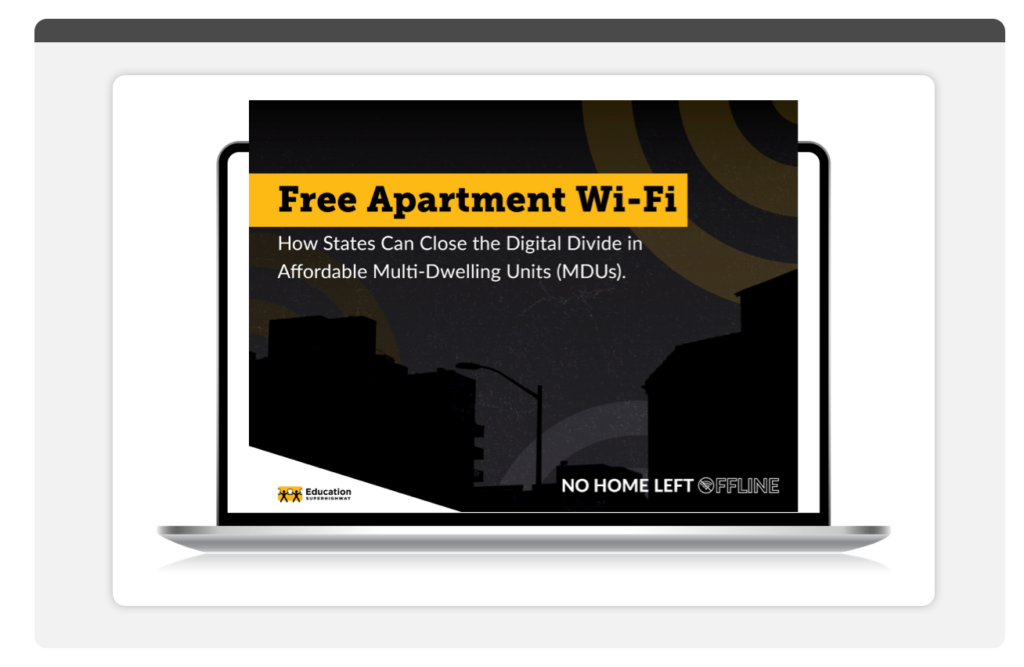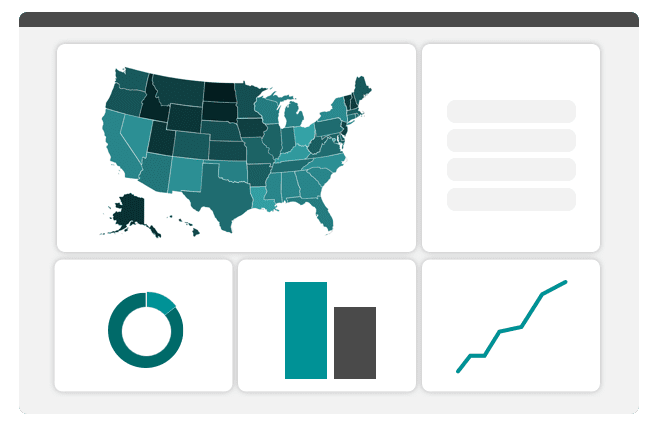SAN FRANCISCO, CA – December 12, 2022 – Today, one hundred and ten organizations representing broadband, housing, education, healthcare, libraries, and state and local governments have written to the Federal Communications Commission (FCC) calling for urgent action to ensure unserved households in multifamily residential housing (MDUs) and Community Anchor Institutions (CAIs) are correctly designated in the recently released FCC National Broadband Map.
In a letter to FCC Chairwoman Jessica Rosenworcel, the group, led by the national non-profit EducationSuperHighway and the Schools, Health & Libraries Broadband (SHLB) Coalition, raised serious concerns about the accuracy of the current FCC National Broadband Map and the subsequent challenge process. Together, they are urging the FCC to pause the current challenge process and develop a new one for MDUs and CAIs to accurately identify their various connectivity status.
The Broadband Deployment Accuracy and Technological Availability (DATA) Act of 2021 required the FCC to change how broadband data was collected, verified, and reported. With the goal of identifying all unconnected households and locations across the nation, the legislation created a process meant to provide more granular broadband service availability data and establish robust reporting requirements for Internet Service Providers (ISPs). While applauding FCC efforts to strengthen their maps, today’s action highlights concerns that internet service to an apartment building does not guarantee service to every unit. The group claims that without accurate unit-by-unit data, the number of unconnected households in MDUs will be drastically undercounted, making the new maps ineffective in determining the funding allocations needed to deliver on the shared goal of closing America’s digital divide.
“The FCC National Broadband Map is critical to allocating over $65 billion in broadband funding to states established in the Infrastructure Investment and Jobs Act (IIJA) and closing the broadband affordability gap,” said Evan Marwell, Founder and CEO of EducationSuperHighway. “Unfortunately, more work is needed to ensure we account for 20-25% of the digital divide that resides in multifamily housing. Currently, the maps consider a multifamily building to be a single location, which fails to accurately identify whether every individual unit is being served.”
The group outlines that the households impacted by these data inaccuracies are among the most digitally disconnected in America, located in high-poverty areas where connectivity has historically been neglected. They also raise concerns that the proposed map will not correctly identify the broadband available to community anchor institutions (CAIs) which under-resourced households rely on for essential services and support. The Broadband Serviceable Location (BSL) Fabric (Fabric), which is intended to identify the individual locations that broadband providers serve, generally treats CAIs as not “broadband serviceable locations.” In their letter to the FCC, the group requests that thousands of libraries, health clinics, houses of worship, and other CAIs that purchase mass market services, be included in both the Fabric and the final version of the map.
John Windhausen Jr., Executive Director of the SHLB Coalition, said “We appreciate the hard work by the FCC staff and CostQuest to provide a detailed map of broadband availability on an address basis. Unfortunately, the map falls far short of being acceptable. The map “grays out” most anchor institutions so that they are not included on the map. This is directly contrary to previous FCC decisions that anchor institutions must be included to the extent they purchase mass market services. Furthermore, the only way for anchor institutions to challenge the ’non-broadband serviceable” designation is to mis-represent themselves as an enterprise or an entity other than anchor institution, which could subject the anchor institutions to penalties. It is time for a do-over – the FCC and CostQuest need to take the time to correct these problems before these maps are used to make any broadband funding decisions.”
The letter outlines that the FCC National Broadband Map Challenge Process needs to be revised to adequately address the broadband needs of CAIs and households living in MDUs. The current process requires households to either challenge the accuracy of the data building by building or rely on benevolent third-party entities to mount a bulk challenge on their behalf. To ensure all MDUs are accurately designated, the group calls on the FCC to shift the burden of proof from unconnected consumers to the ISPs. They recommend pausing the current challenge process and creating a new one that automatically designates MDUs in high-poverty areas as unconnected and establishes a process in which ISPs are required to submit challenges. Additionally, they request that the FCC shift the burden of proof from CAIs to ISPs. They suggest the default be that all anchor institutions are designated (“flagged”) as broadband serviceable locations unless the ISP submits proof that a CAI purchases enterprise (non-mass-market) service.
Without high-speed Internet access at home, Americans can’t send their children to school, work remotely, or access healthcare, job training, the social safety net, or critical government services. To fulfill the Biden/Harris Administration’s commitment to close the digital divide and broadband affordability gap, it is vital that these maps accurately reflect the unconnected communities across the nation and funding is equitably distributed to ensure no home is left offline.
ENDS
ABOUT EDUCATIONSUPERHIGHWAY
EducationSuperHighway is a national non-profit with the mission to close the digital divide for the 18 million households that have access to the Internet but can’t afford to connect. We focus on America’s most unconnected communities, where more than 25% of people don’t have Internet.
From 2012-2020 we led the effort that closed the classroom connectivity gap. In 2013, only 10% of students had access to digital learning in their classrooms. Today, thanks to an unprecedented bi-partisan effort by federal, state, and school district leaders, supported by K-12 advocacy organizations, the classroom connectivity gap is closed – 47 million students are connected, and 99.3% of America’s schools have a high-speed broadband connection.
To learn more, visit www.educationsuperhighway.org
ABOUT SHLB
The SHLB Coalition is a nonprofit, 501(c)(3) public interest organization that supports open, affordable, high-quality broadband connections for anchor institutions and their surrounding communities. The SHLB Coalition is based in Washington, D.C. and has a diverse membership of commercial and non-commercial organizations from across the United States. To learn more, visit www.shlb.org.
ALL 110 SIGNATORIES
EducationSuperHighway
Schools, Health & Libraries Broadband (SHLB) Coalition
All4Ed
American Library Association
Arizona State University
Association for Rural & Small Libraries (ARSL)
Benton Institute for Broadband & Society
California State Library
California Telehealth Network
Capital Area District Libraries
Castleberry Independent School District
Channelford Associates, Inc.
Chiefs for Change
COSLA – Chief Officers of State Library Agencies
Colorado Education Broadband Coalition
Colorado Hospital Association Broadband Services
Common Sense Media
Connect Waukegan
Connected Nation
Council of Chief State School Officers
Council on Affordable and Rural Housing
Digital Equity Institute
Downey City Library
EdTechnologyFunds, Inc.
Educational Professional Services and Educational Consulting Associates
EveryoneOn
Federal Funding Group
Fresno Coalition for Digital Inclusion
Fresno Housing
Fresno Unified School District
Friends & Foundation of Albany Public Library
Funds for Learning
Geeks Without Frontiers
Hennepin County, Minnesota
IBSA, Inc.
Kansas City Public Library
Kansas Office of Broadband Development
Kenosha Public Library
Ladera Education Institute
Lancaster-Lebanon Intermediate Unit 13
LeadingAge
Libraries of Middlesex Automation Consortium
Lit Communities
Local Initiatives Support Corporation (LISC)
Los Angeles County Economic Development Corporation (LAEDC)
Los Angeles County Library
Los Angeles County, Office of Education
Los Angeles County, Internal Services Department
Los Angeles Public Library
Maine State Library
Manufactured Housing Institute
Milwaukee Public Library
Minnesota State Library Services
Mobile Citizen, a Voqal project
Modesto City Schools Information and Educational Technology Services
Mohuman
Multicultural Media, Telecom and Internet Council
National Affordable Housing Management Association (NAHMA)
National Apartment Association
National Association of Federally Impacted Schools
National Association of Housing Cooperatives
National Collaborative for Digital Equity
National Council of Teachers of English
National Leased Housing Association
National Digital Inclusion Alliance
National Multifamily Housing Council
Nebraska Library Commission
New America’s Open Technology Institute
New York Library Association
North Carolina Independent Colleges and Universities
NorthWest Colorado Broadband
NTEN
OCA-Asian Pacific American Advocates
OCHIN, Inc.
Petrichor Broadband LLC
POLAHS (Port of Los Angeles High School)
Positron Access Solutions Corp.
Public Advocacy for Kids (PAK)
Public Health Innovators, LLC
Pullman Public Schools
Redbud Telecom Consulting
Rhode Island Office of Library & Information Services
San Diego County Library
Seattle Information Technology Digital Equity Office, City of Seattle
Shreve Memorial Library
SmartWAVE Technologies
South Carolina State Library
Southern Ohio Health Care Network
Southern Oregon Education Service District
State Library of Iowa
Steamboat Springs School District
Sun Corridor Network
Telconnections, Inc.
Texas State Library and Archives Commission
The Undivided Project
The STEM Alliance
Urban Libraries Council
UNITE-LA
US-Ignite
Utah Education and Telehealth Network
Utah State Library Division
Val Verde Unified School District
Virginia Society for Technology in Education
Volunteers of America National Service
Voqal
VST Services, LP
Washington State Library
Westchester Library System
Westside Elementary School
Ysleta Independent School District





